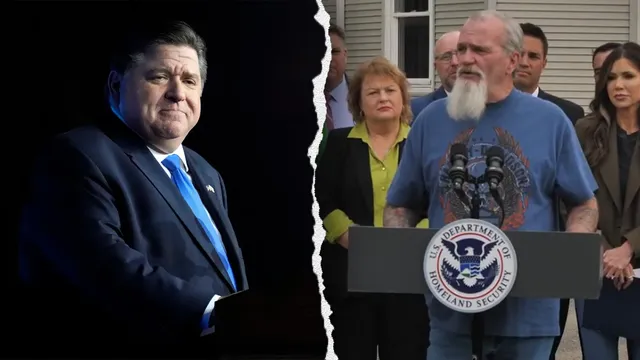
Governors face scrutiny over sanctuary policies in upcoming hearing
2025-05-07 16:30- Democratic governors of New York, Illinois, and Minnesota are summoned to testify about their states' sanctuary policies before the House Oversight Committee.
- Chairman James Comer criticizes these policies for allegedly protecting criminals while jeopardizing the safety of U.S. citizens.
- The hearing is expected to heighten political tensions over immigration enforcement and the role of sanctuary jurisdictions in the ongoing border crisis.
Express your sentiment!
Insights
In June 2025, the House Oversight Committee is set to host a hearing in Washington, D.C. where three governors from blue states are expected to testify regarding their sanctuary policies. New York Governor Kathy Hochul, Illinois Governor J.B. Pritzker, and Minnesota Governor Tim Walz will appear before this committee, led by Chairman James Comer, a Republican from Kentucky. The hearing follows an investigation initiated in January aimed at examining whether these sanctuary jurisdictions protect undocumented immigrants, as criticisms from Republican leaders have grown louder. They argue that such policies obstruct federal immigration enforcement and enhance safety concerns for citizens. Chairman Comer pointed out that sanctuary policies purportedly provide refuge for criminals, referencing former President Biden's border crisis as contributing to the issue. The upcoming hearing is believed to be contentious, with Comer insisting that the governors prioritize the protection of criminal illegal aliens over American citizens. Furthermore, both Governors Walz and Pritzker have been noted as potential candidates for the 2028 presidential race, which adds a layer of political significance to their testimonies and the overall session. Critics of the governors’ sanctuary policies argue that actions taken by their states perpetuate ongoing issues related to immigration enforcement. The governors represent states with laws that restrict local cooperation with federal immigration authorities, as seen in Illinois with the bipartisan Trust Act. Pritzker has expressed his commitment to using every platform available to oppose strict immigration policies that he believes are unjust. As the June 12 hearing date approaches, interest in the outcomes remains high, not only due to the contentious nature of the topic but also because it will showcase the stark division between Republican and Democratic approaches towards immigration enforcement and policies that affect undocumented immigrants. As tensions continue to rise regarding this pressing issue, observers will be keenly watching how the testimonies unfold and what implications they could have on future immigration policy discussions in the United States.
Contexts
Sanctuary city policies in the United States are local ordinances or policies that limit cooperation with federal immigration enforcement authorities. These policies are designed to create a welcoming environment for undocumented immigrants by ensuring that local law enforcement agencies do not actively participate in federal immigration enforcement actions. Sanctuary cities generally do not honor Immigration and Customs Enforcement (ICE) detainers, which are requests to hold individuals for additional time to investigate their immigration status. As a result, local law enforcement is often not required to inquire about an individual's immigration status and may refrain from cooperating in federal immigration-related arrests and investigations. These policies have arisen in response to community concerns about public safety, trust between residents and law enforcement, and the overall impact of deportation activities on immigrant families and communities. The rationale behind sanctuary policies is often grounded in the belief that fostering a sense of safety and security within immigrant communities encourages cooperation with local law enforcement in reporting crimes and participating in community safety efforts. Advocates assert that these policies enhance public safety by allowing immigrant residents to come forward without fear of deportation or intimidation. Moreover, these policies often emphasize that local resources should be utilized for community safety and not for federal immigration enforcement, presenting a perspective that local governments should focus on legal residents and prioritize community needs over federal immigration issues. However, sanctuary city policies have sparked considerable debate among policymakers, law enforcement officials, and the community at large. Critics argue that such policies may undermine the enforcement of immigration laws and pose risks to public safety, suggesting that undocumented immigrants could be engaged in criminal activities that would otherwise be apprehended. Some local government officials have faced legal repercussions and federal funding cuts as a response to non-compliance with federal immigration policies. The Trump administration notably sought to penalize sanctuary cities by threatening to withhold federal grants and funding, which intensified the discussion surrounding the role of local versus federal authorities in immigration enforcement. Despite the controversy surrounding these policies, many cities maintain their sanctuary status, supported by both community members and local leaders who believe in protecting the rights of undocumented immigrants. The landscape of sanctuary policies is continuously evolving, with various legal challenges and shifts in the political climate influencing their implementation. Overall, sanctuary cities reflect a complex interplay between local governance, community values, and the overarching framework of federal immigration law, serving as a critical focal point in discussions on immigration reform and human rights within the United States.